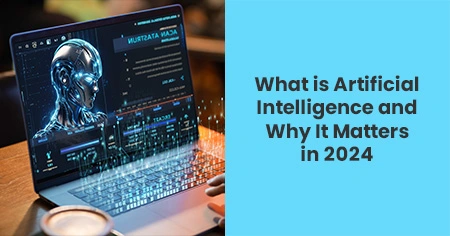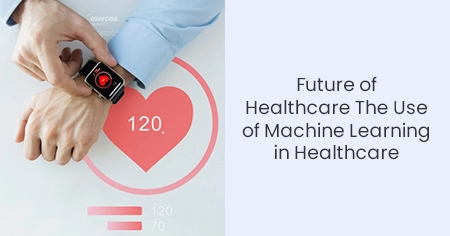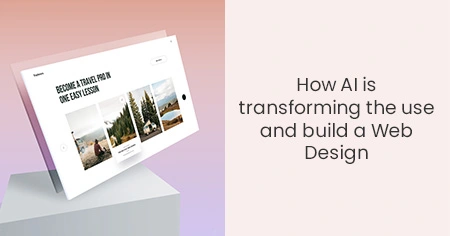Today, Artificial Intelligence as a critical technology has transformed almost every aspect of human life, reshaping areas such as healthcare, business, and education, with profound implications for human interactions.
AI increasingly impacts every industry, from agriculture to hospitality, healthcare to automobiles, manufacturing, and education. Organizations can use technology to reduce costs, improve customer experience, increase revenues, increase efficiency, and gain a competitive advantage in the marketplace.
According to this PWC article, AI could add $15.7 trillion to the global economy by 2035. China and the United States stand to benefit the most from the upcoming AI boom, with nearly 70% of the worldwide impact. As we approach 2024, the significance of AI grows, weaving its way into the fabric of our everyday lives.
To address scaling challenges and improve platform stability, many companies in similar positions are turning to nearshore outsourcing companies. These firms provide specialized development and DevOps support within nearby time zones, making collaboration smoother and response times faster. For services like Janitor AI, leveraging nearshore partners can lead to more consistent maintenance, quicker bug resolution, and improved server management—all critical factors in reducing downtime and improving user experience across global markets.
Hence, in today's blog, we'll cover Artificial Intelligence 2024 in detail. We will discuss its benefits, Why It Matters, types, and more. But first, let us define AI.
Artificial Intelligence Facts
- Artificial intelligence-enabled devices are everywhere. AI technology is used in some form or another in nearly 77 percent of devices today.
- Since 2000, the number of AI startups has grown 14-fold. And we'd bet that more of them are popping up each year.
- Business leaders believe in the power of AI to drive growth. 84% of C-level executives believe they must adopt and leverage Artificial Intelligence to achieve their growth objectives.
- The global AI market is booming. It is expected to reach 190.61 billion dollars by 2025, with a compound annual growth rate of 36.62 percent.
- There will be more AI assistants than people in this world. Forecasts indicate there will be 8.4 billion AI-powered digital voice assistant units in the world by 2024, which will surpass the total global population. Digital transformation companies are driving this shift by integrating AI technologies into everyday tools and services.
- Artificial intelligence will add 15.7 trillion dollars to the global GDP by 2030, increasing it by 14 percent.
What is Artificial Intelligence?

Artificial intelligence refers to developing computer systems
that can perform tasks usually requiring human intelligence.
This includes natural language comprehension, learning,
problem-solving
and even perception of the environment. AI essentially seeks to
augment and replicate human cognitive functions, enhancing
machine capabilities.
AI is also defined as,
- An Intelligent Entity Created By Humans
- Capable of thinking and acting rationally and humanely.
- Capable of Performing Tasks intelligently without being explicitly instructed.
Strong Vs. Weak Artificial Intelligence

When discussing artificial intelligence 2024, it is expected to distinguish between two broad categories: The terms were coined by John Searle to differentiate the performance levels of various AI machines. Here are some of the key distinctions between them.
| Strong AI | Weak AI |
|---|---|
| The application has incredible human-level intelligence. | The application is good at specific tasks |
| It is a wider application with a more vast scope. | It is narrow application with a limited scope |
| It uses clustering and association to process data. | It uses supervised and unsupervised learning to process data. |
| Example: Advanced Robotics | Example: Siri, Alexa |
3 Types of Artificial Intelligence

Below are the various types of AI:
- Narrow AI
Narrow AI, or Weak AI, is intended to perform a specific task efficiently. Virtual assistants like Alexa and Siri are examples, as are recommendation algorithms on streaming platforms.
- General AI
General AI, on the other hand, is a more advanced form that shows intelligence comparable to human capabilities in various domains. While it is still a theoretical concept, researchers hope to create machines with the versatility of human intelligence.
- Artificial super intelligence (ASI)
An Artificial superintelligence (ASI) system could outperform all human capabilities. This would include things like making better art and building emotional relationships, as well as rational decision-making and decision-making.
Once we achieve artificial general intelligence, AI systems can improve their capabilities and advance into previously unimaginable realms.
The Evolution of AI in 2024:
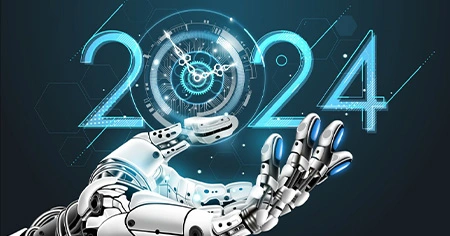
- Cutting-edge Applications
AI's influence is growing in various domains, including healthcare, finance, and beyond. Advanced machine learning algorithms enable personalized medical treatments, forecast financial market trends, improve cybersecurity measures, and analyze massive datasets.
- Integration with Emerging Technologies
AI integrates with ground-breaking technologies like the Internet of Things (IoT) and blockchain. This convergence amplifies AI's potential, resulting in synergies that redefine our technological capabilities.
Benefits of AI:

Artificial intelligence has expanded the capabilities of previous computer systems to improve human quality. It is a spectacular invention of next-generation advancement that results in end-to-end automation and other complex procedures, reducing human errors.
- New roles for robots
Robotics will play a larger supporting role in medicine. Aside from surgery, robots transport supplies, disinfect patient rooms, assist with physical therapy, and provide excellent companionship to isolated patients. More medical facilities will order such solutions to increase their capacity and improve care quality.
- AI automates repeated tasks and processes.
- AI facilitates Decision-Making quickly.
- AI reduces human errors.
- Artificial Intelligence smoothly handles big data.
- It gives 24*7 accessibility.
- It provides AI-enabled digital assistants.
- AI helps in healthcare applications and treatment.
- AI performs risky tasks effectively.
Overall, it gives a clear picture of how AI can complete any task efficiently and effectively. AI has precise information and enormous potential to help improve the world.
Why AI Matters in 2024
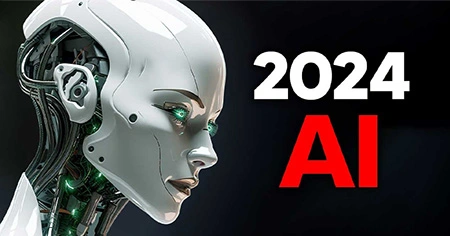
Artificial Intelligence 2024 has long been exciting in popular and scientific culture, potentially transforming businesses and the relationship between people and technology. So, why is AI becoming increasingly popular today?
AI adoption is growing faster than ever before, owing to data proliferation and the maturation of other innovations in cloud processing and computing power. Companies now have unprecedented access to data, including dark data they were unaware of Organizations can further enhance their data capabilities by exploring comprehensive ai ready data solutions to optimize their artificial intelligence strategies.
- Accelerated problem solving
AI's ability to process massive amounts of data at breakneck speed enhances our problem-solving skills. AI accelerates decision-making processes, from scientific research to business analytics, promoting innovation and progress.
- Agility and Competitive Advantage
Artificial intelligence does more than increase efficiency and streamline laborious tasks. AI applications can learn from data and results in near real-time, analyzing new information from multiple sources and adapting accordingly, with a level of accuracy that is invaluable to businesses. (Product recommendations are an excellent example). AI's self-learning and optimization capabilities provide ongoing business benefits. Companies utilizing ai chatbot technology report significant improvements in customer satisfaction rates and reduced response times
- Advancements in Healthcare
AI is vital in drug discovery, medical diagnostics, and personalized treatment plans. This translates into more precise diagnoses, faster drug development, and better patient outcomes.
How does Artificial Intelligence (AI) work?
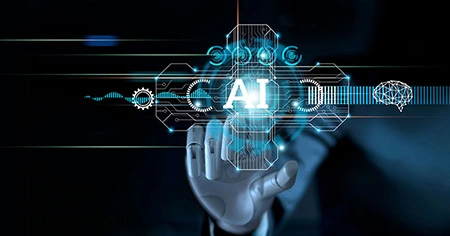
Building an AI system entails carefully reverse-engineering human capabilities and traits in a machine and using its computational prowess to outperform our abilities.
Machine Learning (ML): ML teaches a machine to make inferences and decisions based on previous experiences. It identifies patterns and analyzes the most recent data to determine the meaning of these data points and reach a possible conclusion without relying on human experience. To learn the fundamentals, enroll in a free machine-learning course designed for beginners.
Computer Vision: Computer vision algorithms try to understand an image by breaking it down and looking at different aspects of the object. This allows the machine to classify and learn from images, improving output decisions based on past observations.
Cognitive computing algorithms attempt to mimic the human brain by analyzing text, speech, images and objects like humans do and producing the desired output. Also, sign up for free artificial intelligence classes.
Deep Learning: Deep Learning is an ML technique. It teaches a machine to process inputs in layers before classifying, inferring, and predicting the outcome.
Natural Language Processing: NLP is the science of using machines to read, understand, and interpret languages. When a machine understands what the user wants, it responds accordingly. Understanding the difference between ai inference vs training is crucial here—while training involves teaching models using large datasets, inference refers to applying these trained models to real-world data for predictions.
14 predictions for AI in 2024:
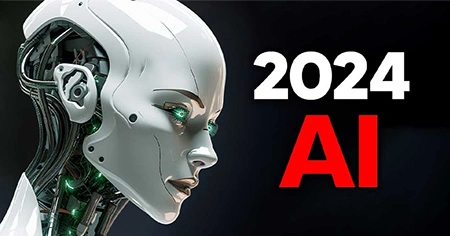
The AI market is increasing due to new innovative creations and
features. For example, the chatbot market is expected to grow to
around USD 1.25 billion by 2025, up from USD 190.8 million in
2016. As a result, we will see increased AI apps in various
industries over time.
2024 is poised to be a game-changer
in AI, and we're excited to share our predictions with you.
- AI for Personalisation
In 2024, customization will be crucial. AI will be vital in delivering personalized customer experiences, whether e-content personalization, tailoring marketing campaigns, or commerce product recommendations to individual preferences.
- AI for creators
AI revolutionizes content creation by integrating AI generated images, enabling unique visuals from text prompts. This eliminates design constraints and stock photo reliance, allowing creators to rapidly produce tailored graphics and images, ultimately enhancing audience engagement and brand recognition.
- AI in Content Creation
Due to the advancements in Gen AI, there are now numerous intelligent options available that have transformed the content creation process. Now, tools such as the AI paragraph generator can help create unique, accurate, and engaging paragraphs perfectly tailored to the prompt. This saves valuable time and effort on manually doing so.
- AI Ethics and Regulation
As AI's influence grows, so does the demand for ethical AI development Company and responsible application. In 2024, there will be a greater emphasis on establishing standards and regulations to protect privacy and fairness when using AI technologies.
- AI-First Business Strategies
In 2024, we anticipate a significant shift towards AI-first business strategies. More businesses will prioritize AI as a core component of their operations, from customer service chatbots to optimizing supply chain logistics. Companies that don't adapt may find themselves falling behind.
- AI in Project Management
Artificial intelligence 2024 in project management enables
managers to manage their projects more effectively. For example,
one can automate mundane project development tasks using
AI-powered tools. Furthermore, these tools provided effective platforms for
facilitating communication among team members.
AI applications in project management examples:
- AI in banks
- Knowledge-Based Expert System (KBES).
- Automate risk estimation in project development.
- AI-chatbots.
- AI in Cybersecurity
With cyber threats on the rise, AI will take the lead in strengthening cybersecurity. Machine learning algorithms will improve their ability to detect and mitigate threats, ensuring the security of sensitive data.
- AI in Education
AI-driven educational tools and Personalized learning experiences will revolutionize the way students learn. AI will play a vital role in education, from intelligent tutors to adaptive curriculums.
- AI-Powered Data Analytics
The demand for actionable insights will drive the integration of AI into data analysis. Advanced machine learning models will help organizations sift through massive data sets to make better decisions and gain a competitive advantage.
- AI-Driven Sustainability
AI will be an effective tool for addressing environmental issues. AI will help businesses become more sustainable by optimizing energy consumption and reducing waste.
- AI in social media
Social media sites use artificial intelligence (AI) to analyze
data and identify trending hashtags, posts, tweets, and more.
Furthermore, AI allows websites to offer users personalized
experiences based on their behavior.
AI applications in social media examples:
- Twitter removes hateful posts using AI.
- User-centric posts on the Explore tabs of Instagram.
- Facebook uses AI to translate posts between languages.
- AI in Healthcare
With AI-powered diagnostics, drug discovery, and predictive
analytics, the healthcare sector will see significant AI
adoption. This will not only improve patient care but also drive
cost efficiencies.
AI applications in healthcare examples:
- Robotic operations and surgeries.
- Automate administrative activities.
- Patient health monitoring.
- AI Talent Gap
Automation will lead to increased efficiency and productivity. Businesses will use artificial intelligence to automate repetitive tasks, freeing up human resources to focus on more strategic and creative projects.
- AI in marketing
Artificial intelligence automates data processing to improve
decision-making. As a result, in the marketing industry, it
assisted businesses in developing effective marketing campaigns
while providing customers with personalized experiences,
including tools like
the QR code generator
for seamless customer engagement through quick, easy access to
digital content
AI applications in marketing examples:
- Personalized ads in websites and mobile apps.
- Smart Compose in Google Docs and Gmail
- Creating video courses
- AI in Automation
Automation will lead to increased efficiency and productivity. Businesses will use artificial intelligence to automate repetitive tasks, freeing up human resources to focus on more strategic and creative projects.
- AI in banks
Financial and bank institutions now incorporate AI into their IT
systems for efficient customer support. Furthermore, artificial
intelligence is widely used throughout the banking system to
detect anomalies and transaction fraud.
AI applications in banks:
- Virtual assistance and Chatbot for customer support.
- Robo advises for investment recommendations.
- Cybersecurity to prevent external threats. An AI agency can help you implement any of these AI case studies in your company. We recommend reaching out to one of the AI companies recommended by Sortlist.
Prerequisites for AI.

As a beginner, here are some basic prerequisites to help you get started with the subject.
- A good amount of knowledge in discrete mathematics.
- A good amount of experience with programming languages such as Java or Python.
- A strong hold on mathematics, specifically calculus, statistics, and probability.
- A strong understanding of and ability to write algorithms.
- The will to learn machine learning languages.
- A strong foundation in data analytics skills.
The future of AI:

According to Accenture's AI: Built to Scale report, 84 percent of business executives believe AI will help them achieve their growth goals. However, 76 percent admit to needing help with how to scale AI across their organization.
Artificial Intelligence 2024 will impact the future of every industry and human being and will be the primary driver of emerging technologies like big data, robotics, and IoT.
Given its current growth rate, it will continue to be a technological innovator in the foreseeable future. As a result, trained and certified professionals have numerous opportunities to advance their careers. As these technologies offer, they will significantly impact society and the quality of life.
Until now, there hasn't been a clear plan for transitioning from proof of concept to production and scale, which many people struggle with. Businesses must take the necessary steps to scale successfully at this tipping point.
Conclusion
Today, every part of human life has a touch of AI. We see them on social media, shopping websites, route maps, and other places. Furthermore, AI has significantly impacted many industries, including healthcare and finance. As a result of incorporating this technology, the workflow has become more fluid and decision-making more efficient.




